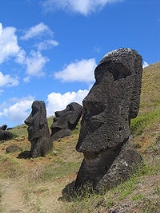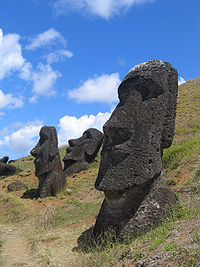
1720s in archaeology
Encyclopedia
The decade of the 1720s in archaeology involved some significant events.

Excavations
- Formal excavations continue at PompeiiPompeiiThe city of Pompeii is a partially buried Roman town-city near modern Naples in the Italian region of Campania, in the territory of the comune of Pompei. Along with Herculaneum, Pompeii was destroyed and completely buried during a long catastrophic eruption of the volcano Mount Vesuvius spanning...
.

Publications
- 1723: Antoine de JussieuAntoine de JussieuAntoine de Jussieu was a French naturalist.Jussieu was born in Lyon, the son of Christophe de Jussieu , an apothecary of some repute, who published a Nouveau traité de la theriaque . Antoine studied at the university of Montpellier, and travelled with his brother Bernard through Spain, Portugal...
publishes De l'Origine et des usages de la Pierre de Foudre on the origins of fossilFossilFossils are the preserved remains or traces of animals , plants, and other organisms from the remote past...
s, prehistoric stone toolStone toolA stone tool is, in the most general sense, any tool made either partially or entirely out of stone. Although stone tool-dependent societies and cultures still exist today, most stone tools are associated with prehistoric, particularly Stone Age cultures that have become extinct...
s and meteorites.
Births
- 1721: Nicholas RevettNicholas RevettNicholas Revett was a Suffolk gentleman and amateur architect and artist.He is best known for his famous work with James Stuart documenting the ruins of ancient Athens. Its illustrations compose 5 folio volumes and include 368 etched and engraved plates, plans and maps drawn at scale...
(died 1804) - 1726: October 12 - Pierre Henri LarcherPierre Henri LarcherPierre Henri Larcher was a French classical scholar and archaeologist.Born at Dijon, and originally intended for the law, he abandoned it for the classics. His translation of Chariton's Callirhoe marked him as an excellent Greek scholar...
(died 1812) - 1729: 25 September - Christian Gottlob HeyneChristian Gottlob HeyneChristian Gottlob Heyne was a German classical scholar and archaeologist as well as long-time director of the Göttingen State and University Library.-Biography:He was born in Chemnitz, Electorate of Saxony...
, GermanGermanyGermany , officially the Federal Republic of Germany , is a federal parliamentary republic in Europe. The country consists of 16 states while the capital and largest city is Berlin. Germany covers an area of 357,021 km2 and has a largely temperate seasonal climate...
archaeologist (died 1812)

